Expressing Emotions Through Crying Idioms
Language offers us powerful gear to share how we feel, specifically at some stage in emotional moments. One way we try this is through idiomatic expressions—phrases that pass beyond their literal meanings to deliver deeper sentiment. When it involves unhappiness or shedding tears, “crying idioms” offer vivid and relatable ways to describe these stories.
These emotional expressions are commonly heard in normal conversations and more formal communication. Rather than actually pronouncing a person as sad or crying, idioms upload depth and creativity to how we talk and write. They assist in painting a clearer emotional photograph, making our phrases greater enticing and impactful.
Understanding idioms related to crying not only strengthens your draw close of the language however additionally facilitates you to connect to others on an extra emotional stage. Whether you are writing, speaking, or definitely looking to interpret someone’s emotions, those terms carry emotional nuance to verbal exchange.
In the sections ahead, we will explore famous crying idioms, how they’re utilized in context, and why they depend on both informal and thoughtful expressions.
Idioms for Crying
1. Bawl One’s Eyes Out
Meaning: To cry loudly and without restraint.
Example: When Emma out of the vicinity of her early life image album, she bawled her eyes out.
Other Ways to Say It: Break down in tears, weep passionately.
2. Shed Tears
Meaning: To cry, frequently quietly or subtly.
Example: The completion of the novel has emerged as so transferring, it made me shed tears.
Other Ways to Say It: Weep, tear up.
3. Cry a River
Meaning: To cry excessively, often for a prolonged period.
Example: He cried in a river after pronouncing good-bye to his prolonged-time friend.
Other Ways to Say It: So carefully, weep without preventing it.
4. Tear Up
Meaning: To begin to cry or enjoy emotions, normally with eyes watering.
Example: Her father’s heartfelt phrases made her tear up right now.
Other Ways to Say It: Get misty-eyed, turn out to be emotional.
5. Break Down in Tears
Meaning: To start crying due to overwhelming feelings.
Example: When reality came out, she broke down in tears.
Other Ways to Say It: Burst into tears, fall apart emotionally.
See also “Idioms That Show You’re Excited“
6. Cry One’s Heart Out
Meaning: To precise deep sorrow thru crying intensely.
Example: After the loss, he cried his coronary heart out for days.
Other Ways to Say It: Sob bitterly, weep with grief.
7. Snivel
Meaning: To whine or cry in a willing manner.
Example: The toddler started to snivel at the same time as denied a greater sweet.
Other Ways to Say It: Whimper, blubber.
8. Choke Up
Meaning: To grow to be so emotional that it’s difficult to talk.
Example: She choked up inside the route of her farewell speech.
Other Ways to Say It: Get emotional, voice crack.
9. Wail
Meaning: To cry out loudly, commonly from ache or sorrow.
Example: She wailed in grief at the identical time as she heard the tragic records.
Other Ways to Say It: Howl, sob noisily.
10. Have a Meltdown
Meaning: To lose emotional control, frequently crying.
Example: After days of strain, he ultimately had a meltdown.
Other Ways to Say It: Break down, lose composure.
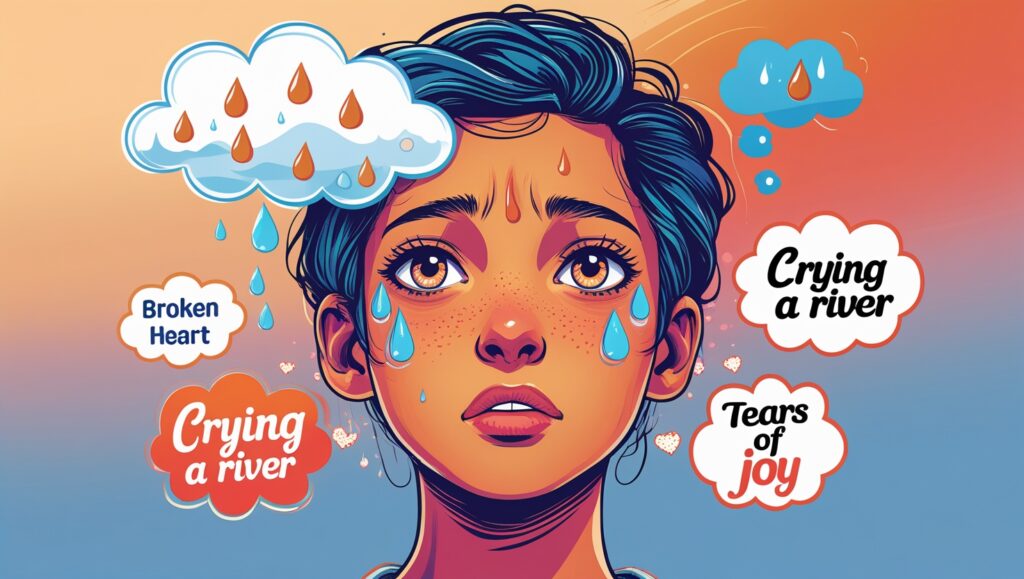
11. Bawl Like a Baby
Meaning: To cry very loudly and childishly.
Example: He bawled like an infant at the same time because the crew was out of location.
Other Ways to Say It: Cry like a toddler, sob loudly.
12. Drown in Tears
Meaning: To cry loads it appears overwhelming.
Example: She felt like she was drowning in tears after the breakup.
Other Ways to Say It: Weep carefully, cry without quitting.
13. Shed a Tear
Meaning: To cry a small quantity, frequently silently.
Example: He didn’t say a word, however quietly shed a tear.
Other Ways to Say It: Break down, cry quietly.
14. Let It All Out
Meaning: To unique bottled-up emotions through crying or speaking.
Example: After keeping returned for weeks, she ultimately allows all of it out.
Other Ways to Say It: Release emotions, vent.
15. Cry Over Spilled Milk
Meaning: To be disenchanted approximately with some factor that can not be modified.
Example: There’s no want crying over spilled milk—simply bypass earlier.
Other Ways to Say It: Dwell on the beyond, regret what’s done.
16. Have a Good Cry
Meaning: To cry deliberately for emotional consolation.
Example: Sometimes, you clearly need to have an exquisite cry and reset.
Other Ways to Say It: Let it out, emotional release.
17. Welling Up
Meaning: To feel tears beginning to shape your eyes.
Example: I felt my eyes welling up as the very last goodbye approached.
Other Ways to Say It: Tear up, feel choked up.
18. Cry on Someone’s Shoulder
Meaning: To search for consolation by using the manner of the usage of sharing sorrow with a person.
Example: She cried on her fantastic buddy’s shoulder after the horrible statistics.
Other Ways to Say It: Seek aid, open up emotionally.
19. Cry Like a Faucet
Meaning: To cry constantly as regardless of the reality that tears gained’t save you.
Example: Once she started out crying, it turned out to be like a faucet grew to grow to be on.
Other Ways to Say It: Sob nonstop, weep without pause.
20. Let the Tears Flow
Meaning: To cry freely without protective decrease all yet again.
Example: After the emotional speech, everyone allows the tears to go along with the flow.
Other Ways to Say It: Cry brazenly, weep without restraint.
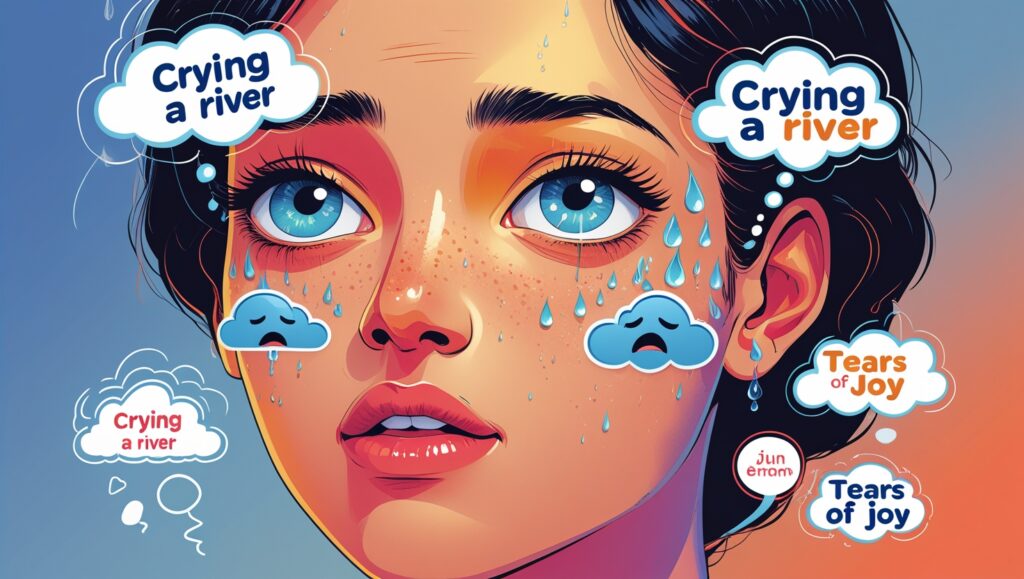
21. Cry a Waterfall
Meaning: To cry too much tears.
Example: She cried at a waterfall the day her sister moved to remote places.
Other Ways to Say It: Cry a river, weep endlessly.
22. Cry One’s Eyes Dry
Meaning: To cry till no tears are left.
Example: He cried his eyes dry after the very last farewell.
Other Ways to Say It: Exhaust your tears, sob until empty.
23. Break into Tears
Meaning: To start crying.
Example: She broke into tears at the same time as she found the surprise letter.
Other Ways to Say It: Burst into tears, begin crying .
24. Shed a Flood of Tears
Meaning: To cry cautiously and uncontrollably.
Example: The own family shed a flood of tears in the route of the memorial.
Other Ways to Say It: Cry profusely, sob deeply.
25. Cry One’s Heartache Away
Meaning: To use crying as a way to cope with emotional pain.
Example: She cried her heartache away after the unexpected breakup.
Other Ways to Say It: Sob via grief, weep away the pain.
26. Tears of Joy
Meaning: Crying from happiness in the location of unhappiness.
Example: She shed tears of pride after reuniting collectively together alongside her own family.
Other Ways to Say It: Happy tears, snug weeping.
27. Cry a Sea of Tears
Meaning: To shed a great deal of tears, usually out of sadness.
Example: Losing her home canine, she cried a sea of tears.
Other Ways to Say It: Weep intensely, sob without saving you.
28. Eyes Welling with Tears
Meaning: Eyes filling up because of robust feelings.
Example: His eyes welled with tears in the direction of the emotional farewell.
Other Ways to Say It: Become misty-eyed, tear-filled eyes.
29. Cry in Silence
Meaning: To cry quietly without making noise.
Example: She cried in silence at the same time as looking at antique snap shots.
Other Ways to Say It: Weep quietly, cry without sound.
30. Tears Rolling Down One’s Cheeks
Meaning: Tears visibly streaming from one’s eyes.
Example: As she smiled on the reminiscence, tears rolled down her cheeks.
Other Ways to Say It: Tears falling, crying softly.
31. Cry Like a Broken Record
Meaning: To keep crying over the identical hassle again and again.
Example: He stored crying like a damaged file about the neglected opportunity.
Other Ways to Say It: Complain again and again, sob again and again.
32. Eyes Swimming with Tears
Meaning: Eyes sincerely complete with tears.
Example: Her eyes were welling with tears after listening to the information.
Other Ways to Say It: Eyes overflowing, tear-crammed gaze.
33. Turn at the Waterworks
Meaning: To begin crying, regularly all of sudden or for effect.
Example: The toddler grew to emerge at the waterworks to avoid punishment.
Other Ways to Say It: On cue, fake a weep.
34. Cry Yourself to Sleep
Meaning: Crying is a common nighttime activity that eventually causes you to go asleep.
Example: After the argument collectively together with her parents, she cried herself to sleep.
Other Ways to Say It: Weep until drifting off, sob in advance than sleep.
35. Eyes Brimming with Tears
Meaning: Eyes so full of tears that they’re at the verge of spilling over.
Example: His eyes have been brimming with tears as he watched his little one carry out.
Other Ways to Say It: Eyes whole of emotion, almost crying.
MCQs
1. What does the idiom “bawl one’s eyes out” mean?
A) To cry quietly
B) To cry very loudly and uncontrollably
C) To fake cry for attention
D) To cry in silence
Correct Answer: B
2. Which of the following idioms means “to cry slightly or silently”?
A) Cry a river
B) Tear up
C) Shed a tear
D) Wail
Correct Answer: C
3. If someone “cried a river,” they most likely…
A) Laughed so hard they cried
B) Slept peacefully
C) Cried a lot over a long time
D) Smiled through the pain
Correct Answer: C
4. “Welling up” refers to:
A) Letting out deep emotions through loud sobbing
B) Eyes starting to fill with tears due to emotion
C) Crying with joy
D) Screaming in frustration
Correct Answer: B
5. What does “cry over spilled milk” imply?
A) Crying after a small accident
B) Being upset over something that can’t be undone
C) Crying from joy
D) Crying loudly in public
Correct Answer: B
6. If someone is “choked up,” they are most likely:
A) Struggling to breathe
B) Speechless from strong emotions
C) Angry
D) Laughing uncontrollably
Correct Answer: B
7. Which idiom suggests a person cried so much, they had no tears left?
A) Shed a flood of tears
B) Cry a sea of tears
C) Cry one’s eyes dry
D) Cry on someone’s shoulder
Correct Answer: C
8. “Let it all out” best describes:
A) Venting or expressing strong emotions through tears
B) Sleeping off sadness
C) Crying fake tears
D) Talking loudly in anger
Correct Answer: A
9. What does “turn on the waterworks” imply?
A) Drinking water to stop crying
B) Crying as a joke
C) Starting to cry suddenly, possibly for attention
D) Shouting out of sadness
Correct Answer: C
10. Which idiom means crying continuously, almost like water pouring?
A) Cry a river
B) Cry like a faucet
C) Eyes swimming with tears
D) Tear up
Correct Answer: B
11. The phrase “cry yourself to sleep” implies that a person:
A) Slept in peace
B) Faked crying to avoid chores
C) Cried until falling asleep
D) Cried in silence
Correct Answer: C
12. If someone has “eyes brimming with tears,” what does it suggest?
A) They’re about to laugh
B) They are fully asleep
C) Their eyes are nearly overflowing with tears
D) They’ve stopped crying
Correct Answer: C
13. What’s the meaning of “cry like a broken record”?
A) Crying repeatedly about the same thing
B) Making loud noise while crying
C) Crying only once
D) Crying silently at night
Correct Answer: A
14. “Cry on someone’s shoulder” means to:
A) Cry without support
B) Seek emotional support and share sadness
C) Laugh together
D) Pretend to be sad
Correct Answer: B
15. Which idiom means to cry slightly and get emotional, but not heavily?
A) Tear up
B) Break down in tears
C) Cry a river
D) Bawl one’s eyes out
Correct Answer: A
Summary
This article explores how idiomatic expressions associated with crying help supply deep emotional reviews in a greater vibrant, attractive, and innovative way. These crying idioms pass past literal meanings to unique numerous kinds of sadness, grief, emotional release, or maybe joy. Common in each informal verbal exchange and formal communique, such idioms—like bawl one’s eyes out, shed a tear, cry a river, and tears of pleasure—upload emotional nuance and individuality to language. By learning and the usage of their expressions, people can decorate their verbal exchange, apprehend emotional states, and connect more deeply with others. The article moreover consists of contextual examples, possibility expressions, and comprehension MCQs for studying reinforcement.
Read more about Idioms At Idiomsinsider
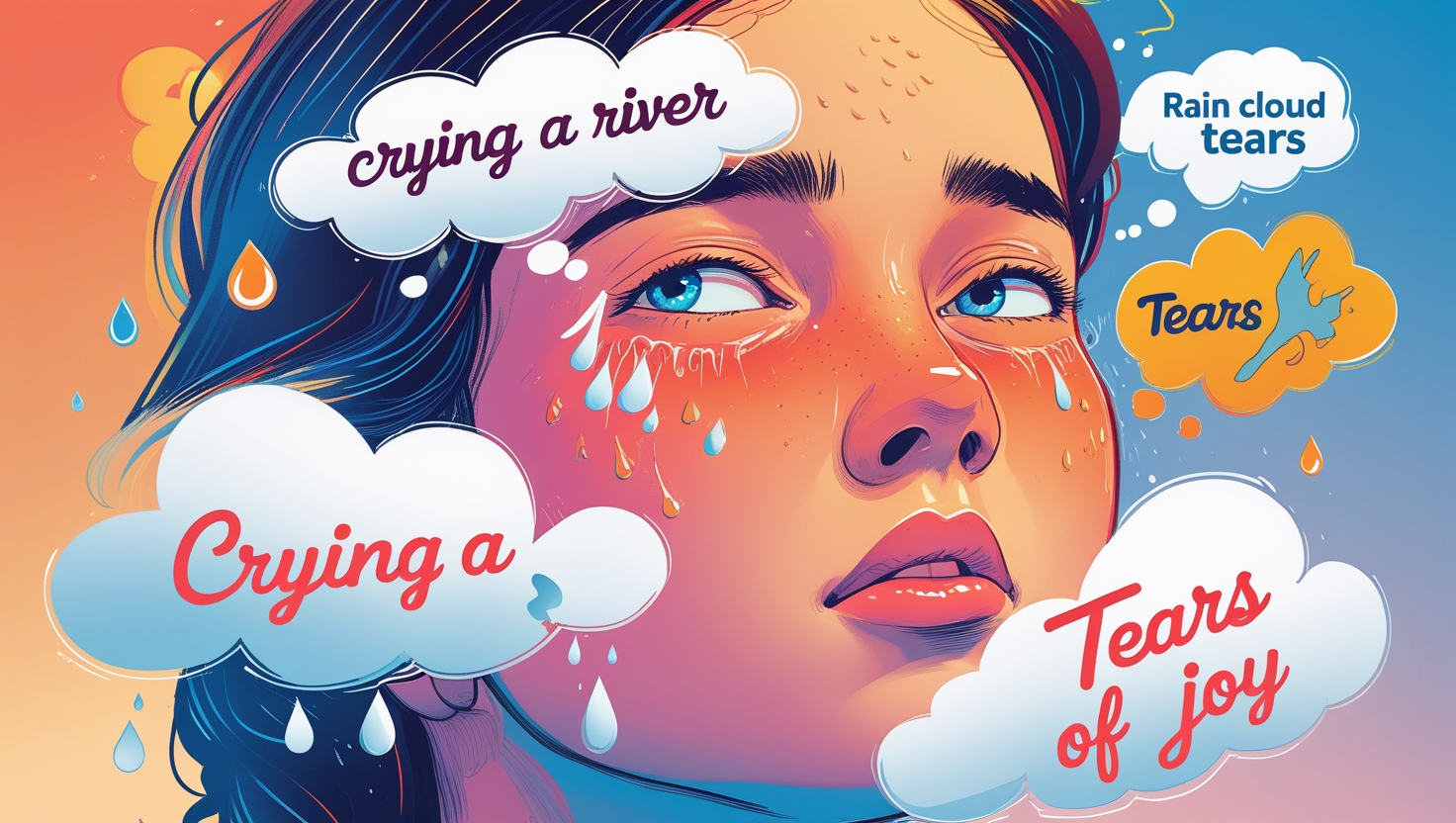
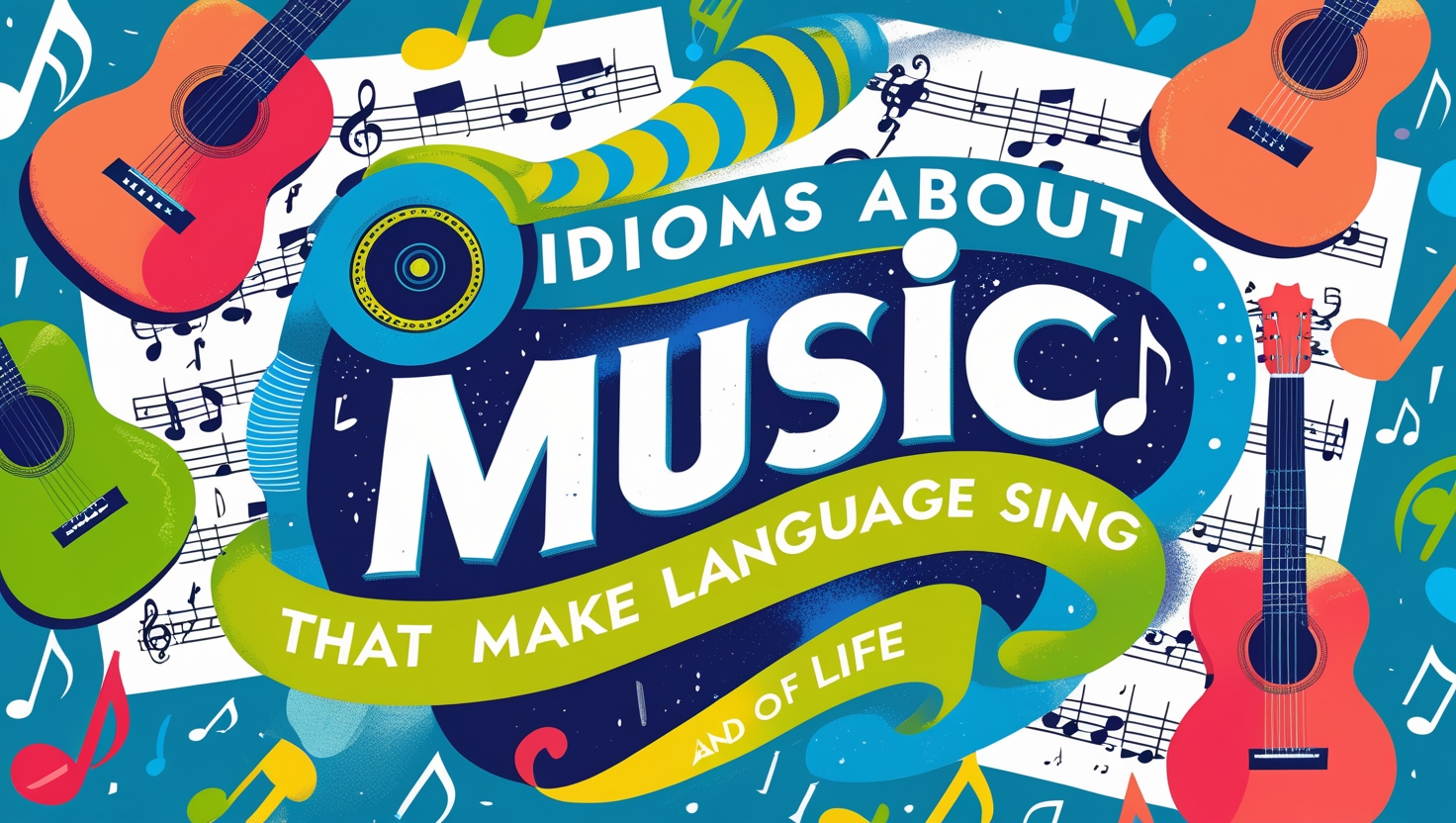

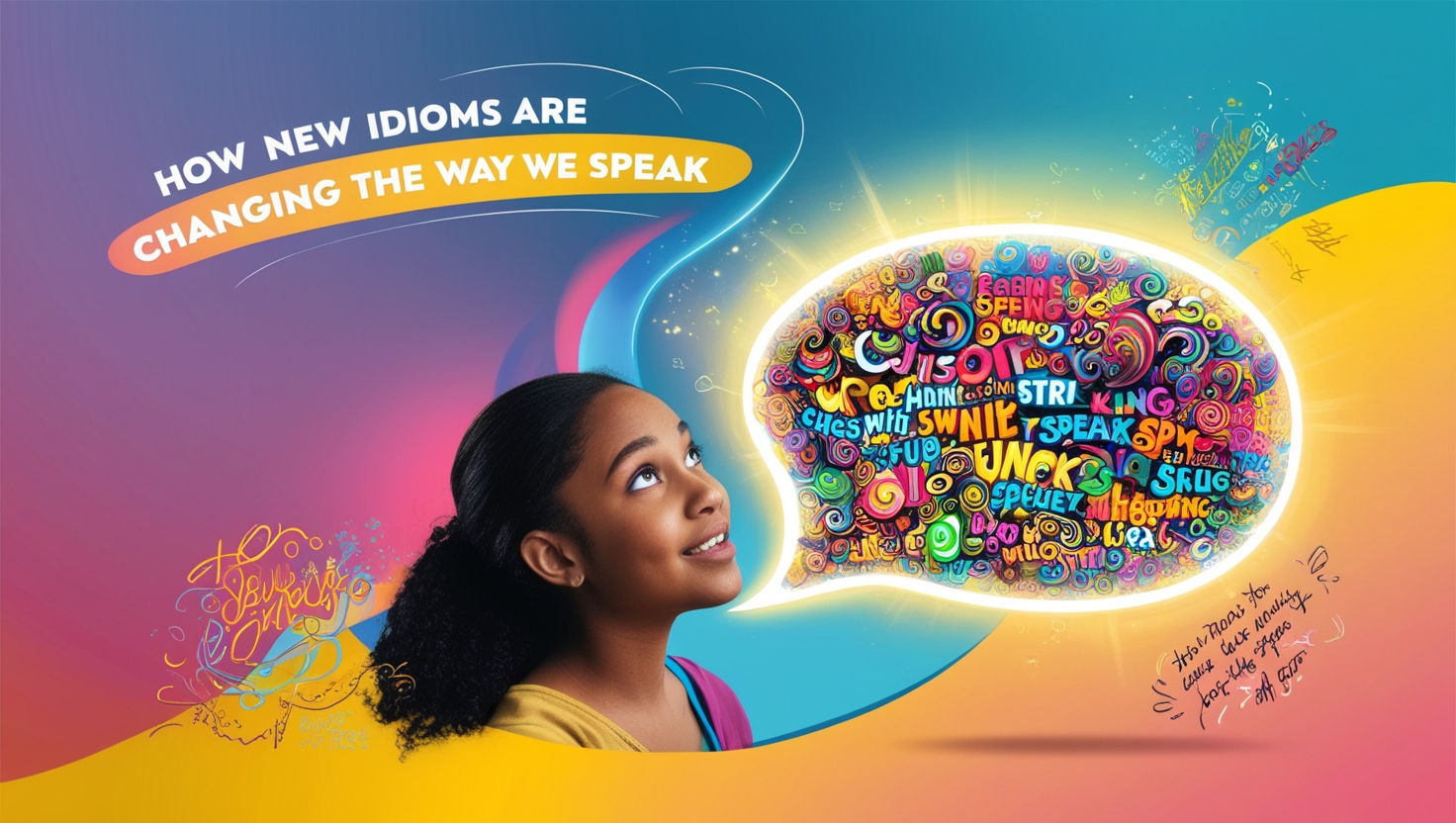
Post Comment